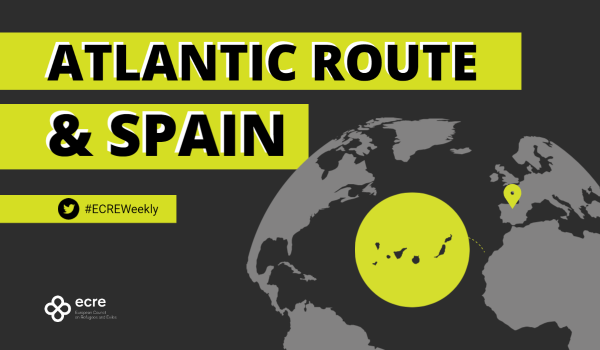An investigation published by BBC has challenged authorities version of events during the deadly Melilla tragedy and put the Spanish government “under fire” from NGOs and left-wing politicians. Meanwhile, EU and its Border and Coast Guard Agency (Frontex) is beefing up migration cooperation with Morocco.
The Spanish government has come “under fire” after a damning BBC investigation of the deadly Melilla tragedy in June: “unveiling new evidence and painful testimony, contradicting the official version of events”. Based on video material, the investigation documents severe abuse by Moroccan security forces including blocking people approaching the Melilla border fence in closed spaces, trapping them while firing teargas and smoke bombs towards them creating deadly panic as well as injuring and beating survivors making them unconscious. Further, footage documents how: “Moroccan forces” were “entering Spanish territory to take migrants back to Morocco, without giving them the opportunity to claim asylum”. As Moroccan authorities dispersed injured people to cities across the country with some reportedly dying on the way, allegedly buried bodies to avoid scrutiny, and deny media access to the morgue in Nador, the estimation of the number of deaths remains unknown but the Moroccan Association for Human Rights reports that 70 people remain missing. According to the left-wing party, Podemos a partner in Socialist Prime Minister Pedro Sanchez’s coalition government called for a parliamentary commission of investigation to be set up, stating: “This report is a hard blow against the official version of the facts”. The same demand has been raised by the founding activist of Caminando Fronteras, Helena Maleno, Amnesty International and ECRE member, CEAR – the latter warning that placing all trust in a country that does not respect human rights means tragedies can happen again. Illustrative of that point Morocco’s response to the tragedy has been waves of arrests of survivors and a crackdown on migrants. Meanwhile, Spanish authorities that have stalled a thorough investigation of the tragedy continue cooperation with Morocco, the Spanish Council of Ministers recently approved sending another €30 million to the north African state for migration control purposes. The organisation, No Name Kitchen recently denounced the lack of access to seek asylum in the other northern Spanish enclave of Ceuta as a violation of international law by Spain.
Meanwhile, the EU whichhas distributed €346 million to Morocco since 2019, and is due to send €500 million more up by2027 continues to expand cooperation with the north African state. On 27 October, Frontex’s interim Executive Director Aija Kalnaja met with the Director General of the Ministry of Interior of Morocco, Wali Khalid Zerouali to “discuss cooperation in the area of border management”. According to the agency: “The meeting was the third in a series of annual discussions held between senior management of Frontex and the Moroccan Ministry of Interior within the framework of the Frontex-Maroc Comite Mixte”. Frontex states the agency: “acknowledges the immense efforts made by the Moroccan authorities to address the challenges of migrant smuggling, trafficking in human beings and other types of cross-border crime. These actions undoubtedly contribute to the security of the European Union. We are committed to further strengthen our partnership with Morocco as a reliable and credible partner, so that we can tackle those challenges together”.
Attempts to cross the dangerous Atlantic route to the Canary Islands continue. Numerous reports of people in distress have beenrecorded. The NGO hotline Alarm Phone reported on 1 November of 52 people missing on the Atlantic for nine days and another 33 people in distress off the Canary Islands the following day. Rescues have also been reported on the Atlantic including 130 people on 28 October and 90 people on 1 November. On the same day, two people were reported drowned trying to reach a beach in Andalusia after jumping off a boat carrying migrants. ECRE member, Accem recently warned of people arriving through irregular routes being exposed to trafficking in the Canary Islands by criminal networks operating in contexts of vulnerability. Reportedly on 3 November, local media confirmed the recovery of the bodies of 34 people to the shore of Dakhla in Morocco and Alarm Phone commented: “So far, we cannot confirm that these deaths are from the group of 52 people we had alerted authorities to on 26 October. This loss of life directly results from the EU border regime and the dirty deals made this year between Spain and Morocco”.
For further information:
- ECRE, EU Southern Borders: Spain and EU Funding for Morocco Amid Crack-down on Migrants, IOM Reports Thousands of Deaths on the Atlantic and Mediterranean as Tragedies Continue, Italy Funds the So-called Libyan Coastguard Amid Protests Over Migration Cooperation, October 2022
- ECRE, EU Southern Borders: Morocco Continues Arresting Migrants as Ombudsman Raises Critique of Spain, SAR NGOs Denounce Maltese Non-Response Tactics As Sea-Watch 3 Remains Blocked, Protest Over Italy Libya Agreement, October 2022
This article appeared in the ECRE Weekly Bulletin. You can subscribe to the Weekly Bulletin here.

